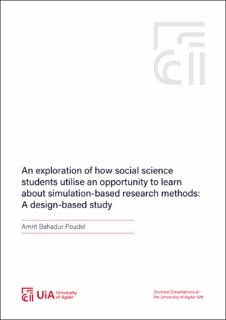| dc.contributor.author | Poudel, Amrit Bahadur | |
| dc.date.accessioned | 2021-06-09T13:08:24Z | |
| dc.date.available | 2021-06-09T13:08:24Z | |
| dc.date.created | 2021-05-31T10:17:26Z | |
| dc.date.issued | 2021 | |
| dc.identifier.citation | Poudel, A. B. (2021). An exploration of how social science students utilise an opportunity to learn about simulation-based research methods: A design-based study [PhD. thesis]. University of Agder. | en_US |
| dc.identifier.isbn | 978-82-8427-031-9 | |
| dc.identifier.issn | 1504-9272 | |
| dc.identifier.uri | https://hdl.handle.net/11250/2758716 | |
| dc.description | Paper I, Paper III and Paper IV is excluded from the dissertation with respect to copyright. | en_US |
| dc.description | Paper III and Paper IV is not published yet. | |
| dc.description.abstract | At the core of this thesis lies an exploration of how social science students utilise an opportunity to learn about Modeling and Simulation (M&S)-based research methods. The study is framed within the Cultural Historical Activity Theory (CHAT). The thesis also utilises local theories such as the community of practice theory, the theory of objectification, and the theory of semiotic representation, and these are used to analyse, interpret and discuss the data generated in the study. During the analysis, boundary-crossing, boundary objects, tension and contradictions within and between activity systems were identified. Metaknowledge underpinning Modelling and Simulation (M&S) research methodology and mathematics, process and product mathematics, and epistemological analysis of simulation-based educational tools are explicated to interpret the data generated and explore students’ meanings and anchor the discussion presented in the dissertation. The study aims to understand how social science students utilise opportunities to learn about M&S-based research methods to study social dynamics. Further, to achieve the goal, the research also explores how students utilise metaknowledge while learning about M&S-based research methods. The study uses a design-based intervention approach to implement an M&S-based research methods curriculum module for students on social sciences programs. The design-based research processes were cyclic and iterative, with each component of the intervention affecting the others. This dissertation includes four independent papers (published or submitted for publication). The overall study resulted in the development of an M&S-based research methods module that was informed by and evolved throughout each intervention. My Paper 1 reports the outcome of intervention study I, which set out to explore the feasible and practical design of an M&S-based research methods module with the students of religion. Precisely, Paper 1 laid an empirical foundation of the study that made it possible to increase the intensity of the M&S-based research methods module in the following iteration with the students of Development Studies. Paper 2 reports intervention study II, which investigates how Development Studies students can gain metaknowledge about M&S-based research methods: its rationale, background knowledge, and opportunities and limitations of the research methods. Using the results of intervention studies, I and II, the next iteration, intervention study III, set out to explore how undergraduate students of religion utilise an opportunity to learn about the M&S-based research method. Paper 3 reports on formative evaluation of ‘meet-the-expert’ event, an element of the M&S-based methods curriculum module implemented through seminars and workshops. Moreover, Paper 4 deals with the pedagogical aspects of M&S-based tools and reveals how such tools can facilitate students’ evolutionary process of mathematical and social science sense-making during their interaction with the social simulation applet. | en_US |
| dc.language.iso | eng | en_US |
| dc.publisher | University of Agder | en_US |
| dc.relation.ispartofseries | Doctoral Dissertations at the University of Agder; no. 326 | |
| dc.relation.haspart | Paper I: Poudel, A. B., Vos, P. & Shults, F. L. (2020). Students of Religion Studying Social Conflict Through Simulation and Modelling: An Exploration. In H. Verhagen, M. Borit, G. Bravo & N. Wijermans (Eds.), Advances in Social Simulation, Springer Proceedings in Complexity, (pp. 379-383). Springer. https://doi.org/10.1007/978-3-030-34127-5_37. Published version. Full-text is not available in AURA as a separate file. | en_US |
| dc.relation.haspart | Paper II: Poudel, A. B., Vos, P. & Shults, F. L. (2019). Students of Development Studies learning about modelling and simulations as a research approach in their discipline. In U. T. Jankvist, M. Van den Heuvel-Panhuizen & M. Veldhuis (Eds.), Proceedings of the Eleventh Congress of the European Society for Research in Mathematics Education. Utrecht University. https://hal.archives-ouvertes.fr/hal-02408983. Published version. Full-text is not available in AURA as a separate file. | en_US |
| dc.relation.haspart | Paper III: Poudel, A. B. (Forthcoming). “So, what is the coolest thing learned… so far”: Undergraduate students utilise an opportunity to learn about modelling and simulation-based research methods. Manuscript. Full-text is not available in AURA as a separate file. | en_US |
| dc.relation.haspart | Paper IV: Poudel, A. B. (Forthcoming). Exploring, experimenting, and sense-making: An epistemological analysis of students’ interaction with social simulation applet. Manuscript. Full-text is not available in AURA as a separate file. | en_US |
| dc.title | An exploration of how social science students utilise an opportunity to learn about simulation-based research methods : A design-based study | en_US |
| dc.type | Doctoral thesis | en_US |
| dc.description.version | publishedVersion | en_US |
| dc.rights.holder | © 2021 Amrit Bahadur Poudel | en_US |
| dc.subject.nsi | VDP::Matematikk og Naturvitenskap: 400::Matematikk: 410 | en_US |
| dc.source.pagenumber | 259 | en_US |
| dc.source.issue | 326 | en_US |
| dc.identifier.cristin | 1912755 | |
